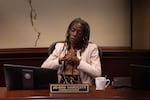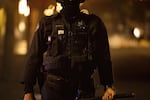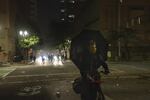City Commissioner Jo Ann Hardesty has been pushing for major changes to the way policing and the criminal justice system work in Portland for decades, but amid the latest Black Lives Matter uprising, she's achieved more change in just the last few weeks than even she may have thought possible.

Portland City Commissioner Jo Ann Hardesty listens to testimony over a proposed ordinance on April 4, 2019.
Kaylee Domzalski / OPB
She talked to OPB’s "Think Out Loud" Thursday about the past few weeks. Hardesty explained why she wants voters — rather than the City Council — to decide on a new independent system for overseeing police discipline. She said she’s not worried about a recent vote of no confidence the Portland Police Association, the union representing rank-and-file officers, just took against the City Council.
And though she wants the mayor or police chief to take more responsibility for when officers use tear gas and crowd-dispersal weapons, she has no interest in taking over day-to-day oversight of the police.
Here’s the conversation. It’s been edited for clarity. You can listen to the entire thing using the audio player at the top of this page.
Q&A with Jo Ann Hardesty
Dave Miller: So what would you have told me at the beginning of this year, if I'd said that in June, the City Council would vote to disband the school resource officer program, the gun violence reduction team, and to leave the transit division?
Jo Ann Hardesty: I would say there's no chance in heck of getting that from a passed by Portland City Council. If you told me that a month ago, I would have said no chance. I've actually put in that request three times in my 19 months at City Hall, and I've never been able to get my colleagues to support it until recently.
Miller: You’ve been in the political world for a long time, at the state level, in the nonprofit world, and then back in elected government at the city level. When did you know this was going to be different — that the uprising in the streets would actually lead to substantive policy or budget changes?
Hardesty: When I started seeing the consistent marches every night. After I think about the first week or so, I was like, 'Oh, well, this is not going to keep going, right? People will get tired. People will go off and do other things.' But rather than it getting smaller, it was getting larger. And I remember sitting in my apartment one night watching these young people, and I went, "I have to go talk to them." …
When I went that night and saw the energy and the commitment of those young people, I knew that we could do it.
Miller: You don't strike me as somebody who spends too long looking back on what you've done; you seem like somebody who is looking for the next thing. So let's turn to what you have been talking about recently: a possible ballot measure to be referred to voters before the November election to create a new system of police oversight in the city. How would it work?
Hardesty: Right now, there would be three main components. This system would be truly independent, which means it would not be connected to the police and would not be a influenced by the Portland City Council. So it would be an independent body that would have subpoena power and the ability to direct discipline. I have been working on this issue for 30 years, and every single time we bring the community together to say, "What do you want to see around police accountability?" the number one issue has been an independent police oversight board.
Miller: How much of the system that you're envisioning would be possible without changes to the existing police contract?
Hardesty: The beautiful thing is that we will have time to do everything we need to do. We will need to make some additional changes to the arbitration rules. We will need to make sure that, at the state level, we've done everything possible to support the community's voice and how the community wants to see police held accountable for inappropriate behavior.
Miller: In other words, a number of things all have to happen — either action by the City Council or at the ballot box from Portland voters, changes for the new police contract and changes in terms of state law regarding arbitration or police accountability. All of those things have to happen for the new system that you envision to be put into place?
Hardesty: That is absolutely right. And the good news is that there will be another legislative special session next month and those arbitration changes that need to happen will be a part of that.
Miller: I want to turn in a little bit to the Salem questions, but just sticking with with the political city question for a second: Why make this a ballot measure at all instead of bringing it to the City Council for a vote, where now three of four people could vote on something?
Hardesty: The reason is I've been around long enough to know that if the City Council implemented this, the police union would push it to the ballot. And so I'd much rather be in a proactive position, taking it to the ballot rather than defending something at the ballot.
Miller: Where do you think Portland voters are on this? There's obviously been a mass uprising in the streets, but that is nowhere close to the full number of Portland voters, and we hear people like President Trump talk nationally about a "silent majority" of people who are on the side of so-called law and order. Where do you think the Portland voting public is on this question?
Hardesty: I think when the voting public sees that community members have been attacked nightly by armed police officers, where we're gassing neighborhoods because a couple of people are involved in criminal behavior, I think the tide has shifted radically from believing police are always right to now understanding that police don't always make the best decisions, and therefore they need to be held accountable like every other public employee.
Miller: This gets us to a letter you wrote last week to the still new police chief, Chuck Lovell. It had eight bullet-pointed requests for him. Can you give us a sense for what you see as the most important requests or demands in that letter?
Hardesty: I think immediately the Portland Police Bureau needs to stop using tear gas, especially in the midst of a pandemic that is spreading rapidly in our state. It's appalling to think that we do not know what the health impacts will be long-term and even short-term for people who were being gassed nightly by people who were sworn to protect and serve. So we've got to stop that immediately.

A sticker covers the nametag of a Portland police officer during protests against police brutality and systemic racism in Portland, Ore., June 15, 2020.
Jonathan Levinson / OPB
We absolutely have to make sure that we're able to identify officers who are involved in misconduct; the fact that Portland police officers have covered their badges and are unwilling to actually identify themselves when community members asked, I've asked Chief Lovell to make them put their ID number in very large, reflective letters so that people don't have to walk into a police officer's personal space to be able to identify who they are.
Miller: Another issue that you brought up is you want much more clarity and transparency in terms of when protests are deemed illegal and when various uses of force are used — tear gas or various projectiles and there were other specific items as well.
Related: Portland Police Under Scrutiny For Dangerous Crowd Control Munitions
Hardesty: When we declare a gathering unlawful, I want to make sure that either the mayor, as the police commissioner, or the police chief himself is the one that makes that call. I think when you are on the ground, you may make decisions that are not logical or thoughtful about how you use additional force to try to get your message across. And let me just say, to tear gas people because people are touching a fence is insane to me. That that makes absolutely no sense and so on.
And police are in riot gear. So somebody throws a water bottle at you and your response is to tear gas hundreds of people? To me, that's just not good policing.
Miller: Have you had any back-channel conversations with the chief or the mayor specifically about your demands?
Hardesty: I actually had a conversation with Chief Lovell last week because, as you know, the police are off on this PR campaign to get the public to actually talk about good protesters and bad protesters, right? Trying to get community leaders to say, you know, we need to have people stop this? And what I said to Chief Lovell is I cannot talk about community violence isolated from police violence. And so I asked him, "Can you perceive that the police may have overreacted at various incidents over the last month?" And he could not. As a police chief, he could not see that the police have ever made a mistake. And I think that's the problem.
Miller: You’re one of 13 people that the governor appointed to this task force that is going to be reviewing police training and hiring practices. The idea is to issue recommendations to the governor by Nov. 1. At this point before you have met, do you have a sense for some of the specific changes you want to see in terms of training for every single law enforcement officer? Do you already know the changes you want to see?
Hardesty: There are two big ones that I think of as critical. One is that we have to stop training law enforcement as if they're going to war. … Every training that is not a weapon or automobile training should have a community member as a co-facilitator.
The second one is that no one should be training police officers who doesn’t have an excellent record. In fact, I know many former Portland police officers will retire without ever pulling their weapon and pointing it at anybody. To me, those are the kind of people we should be recruiting to train, not based on personal relationships or the old boys’ network. That’s what we have right now.
Miller: Let's take a step back because the phrase "defund the police" has been used by many people over the last month and a half, and many people have different things in mind when they say those same words. Do you want there to be a Portland Police Bureau? Five years from now do you want there to be people with police uniforms policing in Portland?
Related: The Safety Net Is Broken: How Police Became Mental Health First Responders
Hardesty: Yes, I do. I am not in the camp that believes that we can have a society without police. People will still be murdered. Children will still be abused. Domestic violence will still happen. But the question is, how many do we need? I actually think we have way more than we need, because we are sending police to things that they have no business going to. And that's why Portland Street Response that is now funded for six units across the city of Portland — once COVID is over — is going to show people that we have alternatives to calling people with weapons.
Miller: We could have spent this entire conversation talking about the back-and-forth you have had recently with Daryl Turner, the president of the rank-and-file officers union. Wednesday he announced that the union has no confidence in the City Council. On the union’s website right now it says "You can't have police reform without funding." They talk about recruiting, training and officer wellness, and community policing, and the existing shortage. They say that’s actually one of the problems: that they don't have money to have enough officers to walk beats to have relationships with people in the community. What do you make of this basic idea that more money could lead to better policing?
Hardesty: If that were true, we'd have better policing today. The police bureau gets a significant portion of the city's general fund. I do not believe that Daryl Turner has any interest in police reform because, quite frankly, he's been a union president for 10-plus years, and I have not seen him lead any efforts around police reform. Let me just talk about the no confidence vote: This is a usual tactic of [the Portland Police Association]. When they don't get what they want, they blame the City Council. But the City Council's job is not to give the police what they want. It is to give the public what it wants, and the public have spoken loud and clearly that they feel like they're over-policed and that they are being treated very aggressively by the police force that we have.
Miller: How much time do you feel like you have right now to take more bold actions while your fellow elected leaders at the city or county or state levels feel urgency?
Hardesty: The great news is we have a new DA coming in, Mike Schmidt, who is a reformist, and a governor committed to making changes at the state level, and we have a mayor who is absolutely committed to continuing the reforms that we have been talking about. I think all the stars have aligned.
Miller: But human beings have a tendency to get distracted, especially if they come from communities that historically have not been affected by over-policing. Do you feel like there is a clock ticking where the uprising in the streets will cease to make an impact on white people in power?
Hardesty: I actually think that even though the protest is about Black lives and in seeking civil rights as a Black person in America, the ironic thing is a lot of white people have been injured by Portland police in the last month, people who never ever saw the police as anything but people that protected and served. And so we have many more white people who have the lived experience that Black people have had in this community now.

A person bicycles away from police during a protest against police brutality and systemic racism in Portland, Ore., July 4, 2020.
Jonathan Levinson / OPB
When I get emails from mothers who say "my 14-year-old child was gassed by the police, and my child was not involved in any bad behavior," or when I hear from faith leaders that they got surrounded by police, that police just tear gassed everybody and they were not involved in any illegal behavior, I think the public is much more aware now of the secrecy around how police operate and who they believe they are accountable to.
The protests will end, right? People can't protest every day for the rest of their life. The protests will end. It is my hope that once we get the City Council to refer this measure that we will be able to get people involved and helping us make the fundamental changes that we have to make. We still have to change who actually does the psychological evaluation for police. We have to change how we recruit police officers. We have to change how we train police officers, and we have to absolutely change what our expectations are for police in our community.
Miller: I want to run this line by you; it was a sub-headline for a Willamette Week article a few weeks ago. It read: "Mayor Ted Wheeler is the police commissioner, and in charge of the city's budget, but Hardesty is at the wheel." What do you make of that line?
Hardesty: I mean, I'm humbled by that headline, but let me just say I think my colleagues have recognized that I have 30 years of experience working on police reform in the city of Portland. I have more experience than my colleagues combined working on police reform. And so I'm appreciative that they are following my lead and my recommendations because I've been around long enough to know just where the blind spots are when it comes to ensuring that the police department serves everyone equally and to hold them accountable. I talked to the mayor as soon as I saw that headline because I didn't want him to be mad at me, right? And he laughed. He didn't take it as a personal insult.
Miller: Have you talked about having him name you police commissioner?
Hardesty: Oh, gosh, no way. We have not had that conversation, and I would decline.
Miller: That's the most surprising thing of the last 25 minutes. Why in the world would you decline? You'd have power to do exactly what you want to do.
Hardesty: I am doing it.
Listen to the entire conversation using the audio player at the top of this page.